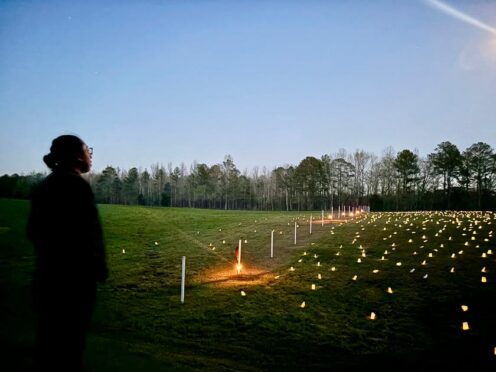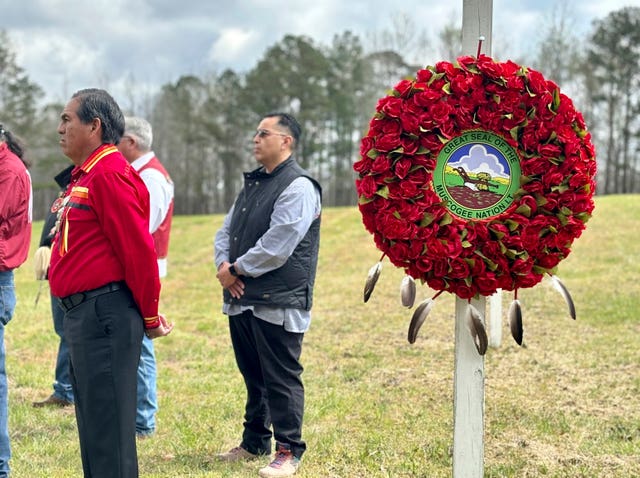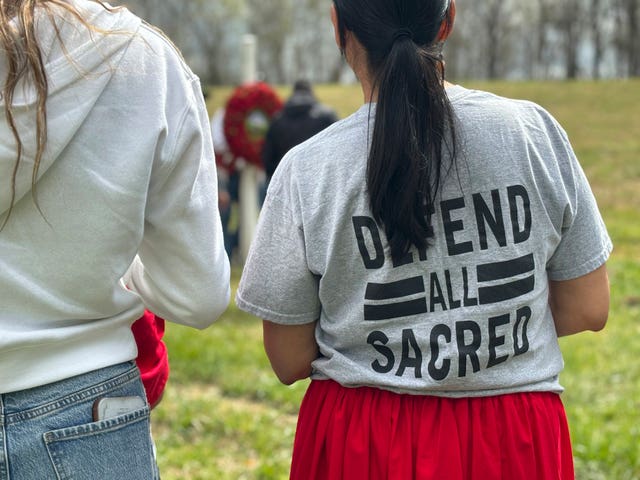
Members of the Muscogee Creek Nation have held a memorial service in Alabama to mark the 210th anniversary of a battle which was the single bloodiest day of conflict for Native Americans with US troops.
Prayers and songs of remembrance carried across the grassy field where more than 800 Muscogee warriors, women and children perished in 1814 while defending their homeland from US forces.
The battle of Horseshoe Bend paved the way for white settler expansion in the country’s south-east and the tribe’s eventual forced removal from the region.
David Hill, principal chief of the Muscogee Creek Nation, said of the Saturday ceremony: “We don’t come here to celebrate. We come here to commemorate, to remember the lives and stories of those who fought and honour their sacrifice.”
Some 1,000 warriors, along with women and children from six tribal towns, had taken refuge on the site, named for the sharp bend of the Tallapoosa River.

They were attacked on March 27, 1814, by a force of 3,000 led by future US president Andrew Jackson.
Mr Hill said: “They were going to fight to the end. The warriors were going to do what they could do to protect the women and children, protect themselves, protect our freedom, what we had here.”
Leaders of the Muscogee Nation placed a wreath on the battle site.
The wreath was made of red flowers, in honour of the warriors who were known as Red Sticks. It was decorated with six eagle feathers in recognition of the six tribal towns that had taken refuge there.
Despite signing a treaty with the US, the Muscogee were eventually forcibly removed from the south-east to Oklahoma.
Some of their descendants made the journey back to the land their ancestors called home to attend the remembrance ceremony.
“Hearing the wind and the trees and imagining those that came before us, they heard those same things. It wakes something up in your DNA,” said Dode Barnett, a member of the Muscogee Nation Tribal Council.

RaeLynn Butler, the Muscogee Nation’s secretary of culture and humanities, has visited the site multiple times but said it is emotional each time.
She said: “When you hear the language and you hear the songs, it’s a feeling that is just overwhelming. Painful. Even though it’s hard to be here, it’s important that we share this history.”
The Muscogee Nation has announced plans to try to place a permanent memorial at the site.
At sunset, luminaries were placed on the field to remember the Muscogee people who lost their lives there.
A song was sung in the Mvskoke language and the names of the tribal towns were read out over the site along with shouts of “Mvto”,meaning thank you.
Jonodev Chaudhuri, Muscogee Nation ambassador to the US, said: “Our tribal towns remain. Our culture remains. Our people remain. Our blood remains. And our ideas remain.
“The battles we fight today, to protect our culture, and protect our way of life, protect our sovereignty, is a direct through line to the lessons that were given to us by these brave, brave folks who lost their lives here protecting what is most dear to us.”

Enjoy the convenience of having The Sunday Post delivered as a digital ePaper straight to your smartphone, tablet or computer.
Subscribe for only £5.49 a month and enjoy all the benefits of the printed paper as a digital replica.
Subscribe